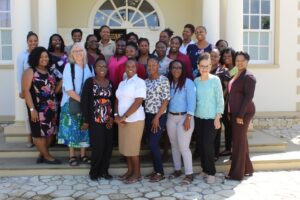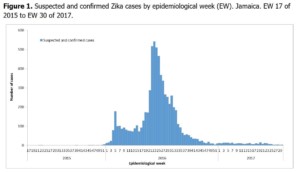Zika Response – “Not Too Late” in Jamaica: ASSIST’s Innovative Approach Integrating Gender to Strengthen Psychosocial Support Services Today, for Tomorrow
By Morgan Mickle, Gender Specialist, WI-HER, LLC

Participants in Trewlany pose for celebratory photo after successful first training.Photo Credit: Morgan Mickle, WI-HER, LLC (2018)
In October 2018 I arrived in Jamaica from the United States to facilitate two weeks of gender sensitization and capacity building training for local health professionals on the island. I recall proudly handing my passport over to the Jamaican immigration official as I stated, “I’m here for a conference on Zika”. To which the official inquisitively responded “Zika? You’re a little too late.”
The World Health Organization (WHO) defines Zika virus as a mosquito-borne flavivirus that was first identified in humans in Uganda and Tanzania during the 1950s[i]. Outbreaks of Zika virus have since been recorded in Africa, the Americas, Asia, and the Pacific. Most recently, French Polynesia and other territories in the Pacific experienced a large outbreak of Zika virus in 2013 followed by Brazil in March of 2015. Soon after, outbreaks and evidence of transmission appeared across the Americas, Africa, and other regions of the world. Zika virus is primarily transmitted from the bite of an Aedes mosquito but can also be transmitted through sexual intercourse. Zika virus during pregnancy is a cause of congenital brain abnormalities, including microcephaly, but can also cause pre-term births and miscarriage. Zika virus first appeared in Jamaica in January 2016[ii], with suspected and confirmed cases peaking mid-year[iii] (see Figure 1). As of January 4, 2018[1], the PAHO/WHO reported 7,772 suspected and 203 confirmed cases[2] of Zika virus on the island, a cumulative figure of data collected between 2015 and 2018[iv].

Source: PAHO Jamaica Zika-Epidemiological Report 25 September 2017
In Jamaica, gendered norms regarding women as the nurturers and caregivers are widely prevalent. The United Nations reported that, “while both parents are legally responsible for the maintenance of their child/children, mothers (particularly single mothers) carry a disproportionate burden of care for children[v].” This is especially important in the context of Zika where children affected by Zika need physical therapy, cognitive stimulation therapy, and extra assistance with everyday activities, which can result in an increased financial and care burden. Primary caretakers, usually the mother or another female family member, may face challenges in working outside the home or spending time on non-caregiving pursuits, like education. In addition to isolation, these women and other family members often lack support structures to cope with the demands of caring for a child with severe disabilities and experience challenges to access services[vi]. In Jamaica, the stakes are high as female-headed households account for 45.4 percent of all households[vii].
Also relevant are findings from the recent Women’s Health Survey 2016 – the first-ever survey to measure the prevalence of gender-based violence in Jamaica – which found that one in four (27.8%) women in Jamaica between the ages of 15 and 64 have experienced intimate partner physical and sexual violence in their lifetime[viii] [ix]. As Zika can be transmitted sexually, this context is extremely important to consider. In Jamaica, as in the rest of the region, sexual and gender-based violence is deeply rooted in gender and social norms characterized by unequal power relations between men and women. These norms, combined with women’s attitudes on violence, also influence whether or not they seek support.
Since early 2018, ASSIST has worked through its partnerships with the United States Agency for International Development (USAID) and Jamaica’s Ministry of Health to strengthen health services in the context of Zika specifically focusing on improvements in quality surveillance to assess developmental milestones in babies and infants, as well as to care and support for infants and families affected by Zika. The effort solidifies that though reported cases of Zika have decreased since the 2016 initial peak, the virus remains a relevant and important public health issue – one community members should be aware of. This continued education starts from the ground up from a united community health network to support the overall health and well-being of others. The focus of the recent Psychosocial Support and Gender Sensitization training series was to strengthen health provider skills to address the impacts of Zika for all family members including women, men, partners, children, and extended family.
From October 17-29, 2018 WI-HER, LLC, gender expert partner for the USAID ASSIST Project, led four, 3-day gender trainings bolstering psychosocial support efforts for Ministry of Health professionals reaching over 80 participants from different regions of Jamaica. Participants included senior Ministry of Health officials from the Family Health Unit and a variety of health providers in the field – doctors, nurses, registered midwives, mental health officers, medical officers, and community health aides. The training, while focused on Zika, strengthened skills that can be applied across health services. Most important to the core of the workshop, was to build and improve the capacity of all types of health practitioners to provide gender-sensitive psychosocial support. In reality, few patients see mental health specialists and their first impressions at primary care health centers can either foster positive health seeking behaviors or drive clients away.
The gender components of the training – led by Dr. Taroub Faramand and myself with integral support from Dr. Charlene Coore-Desai, Resident Advisor for ASSIST Jamaica – used interactive adult methodologies to communicate the importance of understanding and applying a gender lens when delivering psychosocial support services. Through the training, WI-HER helped participants identify how societal attitudes and expectations of women, girls, men, and boys, as well as their differing attributed roles and responsibilities, can impact personal health choices. For example, recognizing that many men decide to go to a health facility only when they feel the situation is at its worse, or noticing that some woman choose not to take their child with disabilities to the hospital because they feel they may be mocked by other patients or treated poorly by providers. Additionally, we increased awareness of gender-based violence and potential health implications, and ultimately worked to strengthen strategies to successfully communicate with patients on health issues pertinent to them, including the Zika epidemic.
Everyone has a role to play. Through the ASSIST trainings, Jamaican health providers now have an increased knowledge of how to provide gender-sensitive psychological support to women, men, partners, children, and families affected by Zika virus. Through discussions on relevant Zika issues, knowledge exchange, and action planning between participants, the workshop helped prepare health facilities with the tools they need to deliver quality gender-responsive services. Families will be provided with dignified health education at health institutions, fostering a safe place for return visits and continued care. Finally, more people will be aware that Zika and its potential long-term outcomes are still a relevant and important reality.
We must be aware of the power in words. Even though I came to these workshops very well-prepared to train, I also understood the possibility to learn more. As WI-HER’s training approach follows sensitization and discussion, content sharing, knowledge check, and applied learning, activities to identify gender norms and rules allowed us to gain more insight to what it means to be a man, woman, and member of society in Jamaica. The consensus (though close to 100% women in these trainings) noted across all trainings was that it is generally easier for a man to abandon a child than a woman, and more so if that child is born with disabilities (such as developmental delays associated with babies affected by Zika). However, societal norms reinforce associations of caretaking with women, making it more difficult for a woman to abandon her child. More unexpectantly however, was the sense of pride associated with Jamaican women and caring for their children. When prompted with the notion of “who” would help a woman take care of her child (trying to jumpstart conversations about support systems) participants in one training overwhelmingly shared that it could be perceived as insulting and disempowering by implying that a woman was “not able take care of her own child”. The conversation reinforced for me that language is important and while working to support clients, we must always empower them.
As I reflect on my two weeks in Jamaica, I think about the dedicated professionals that serve as the backbone of health services and the foundation for health education and support across the island. Specifically, I think about those 80 practitioners with an affinity to learn, a passion to help their communities, and newly strengthened skills to address the particular needs of women, girls, men, boys, and families around them. It’s with this in mind that I smile and think to myself…we’re not “too late”, we’re just getting started.
WI-HER and ASSIST will continue to support all project health facilities to improve the quality, access, and utilization of care. Following on the heels of this training series, WI-HER will facilitate an in-depth Gender Integration to Strengthen Zika Response training for Ministry of Health partners and contribute to further sharing and knowledge exchange at the upcoming Learning Sessions; both activities are planned for 2019.
From 2012-2017, the USAID ASSIST (Applying Science to Strengthen and Improve Systems) Project fostered improvements in 38 countries in a range of health care processes through the application of modern improvement methods by host-country providers and managers and build the capacity of host-country systems to improve effectiveness, efficiency, client-centeredness, safety, accessibility, and equity of the health services they provide. In a two-year extension from 2017-2019, ASSIST will apply quality improvement methods to health systems strengthening efforts in Zika-affected countries, including Antigua, Dominica, Dominican Republic, Ecuador, El Salvador, Guatemala, Honduras, Jamaica, Nicaragua, Paraguay, Peru, St. Kitts and Nevis, and St. Vincent and the Grenadines.
WI-HER, LLC (Women Influencing Health, Education and Rule of Law) is a woman-owned small business that partners with international donors, national governments, non-governmental organizations and others to identify and implement creative solutions to complex development challenges to achieve better, healthier lives for women, men, girls, and boys. Founded by Dr. Taroub Harb Faramand in 2011, WI-HER, LLC works to integrate gender through contextualized, adaptable, and systems strengthening methods that can be seamlessly integrated into ongoing and new programs. WI-HER is committed to ensuring equal opportunities for women, men, girls, and boys, as well as all other vulnerable groups, including LGBTQI+ people.
[1] The most recent data reported on PAHO’s website
[2] PAHO/WHO definitions of suspected and confirmed Zika cases can be found at: https://www.paho.org/hq/index.php?option=com_content&view=article&id=11117:zika-resources-case-definitions&Itemid=41532&lang=en
[i] http://www.who.int/news-room/fact-sheets/detail/zika-virus
[ii] https://www.usatoday.com/story/news/2016/01/30/jamaica-reports-first-case-zika-virus/79563246/
[iii] https://www.paho.org/hq/dmdocuments/2017/2017-phe-zika-situation-report-jam.pdf
[iv] https://www.paho.org/hq/index.php?option=com_docman&view=download&category_slug=cumulative-cases-pdf-8865&alias=43296-zika-cumulative-cases-4-january-2018-296&Itemid=270&lang=en
[v] https://tbinternet.ohchr.org/_layouts/TreatyBodyExternal/Countries.aspx?CountryCode=JAM&Lang=EN
[vi] http://www.who.int/csr/resources/publications/zika/psychosocial-support/en/.
[vii] https://www.unicef.org/jamaica/UNICEF_20180618_SituationAnalysis_web.pdf
[viii] http://www.jamaicaobserver.com/latestnews/Every_fourth_woman_in_Ja_experience_gender-based_violence_%26%238211;_survey?profile=1228
[ix] http://caribbean.unwomen.org/en/news-and-events/stories/2018/6/press-release-jamaica-first-national-survey-on-gender-based-violence-launched